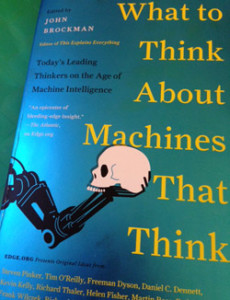
Christmas is past, the new year ahead, and in between traveling to and fro, baking, cooking, and cleaning, I’m able to do a bit of reading and thinking. They go together, of course; it’s one of the reasons I read.
Right now, I’m thinking, and reading, about the ethics of technology and science–the ethical challenges, that is. I have a long-standing fear that our scientific and technical achievements are outpacing our ethical thinking about them, and that we aren’t ready as a civilization, as a species, to understand and navigate the ethical challenges we’re posing for ourselves.
 That’s why I picked up the book What to Think About Machines that Think when I saw it recently in my local bookstore. Perhaps I wanted to explore what others are thinking about this; perhaps I simply wanted reassurance that others are thinking about it at all. Certainly I was thinking it might be a good book for a certain one of the young people on my holiday gift list, and he was my excuse for buying it for myself.
That’s why I picked up the book What to Think About Machines that Think when I saw it recently in my local bookstore. Perhaps I wanted to explore what others are thinking about this; perhaps I simply wanted reassurance that others are thinking about it at all. Certainly I was thinking it might be a good book for a certain one of the young people on my holiday gift list, and he was my excuse for buying it for myself.
I’m less than halfway through it, and not disappointed. It’s challenging, I must say–not just in the subjects it considers but in some case in the level of scientific knowledge it assumes on the part of the reader. I’m no scientist, and science books can be really hard for me. But this is a good challenge, one I’ll keep at.
It’s comforting to know that many of our world’s leading minds–both scientists/technologists and philosophers–are considering the ethical and philosophical quandaries posed by technology. The book is a collection of short essays by different authors, and many of them specifically address these questions. Of course, each author was asked to consider the question “What do you think about machines that think?”–so some of these folks might not have been actively thinking about the question at all prior to receiving the prompt. But the essays also point to specific efforts underway to encourage this type of exploration–programs in place at Stanford or MIT, for example–and that’s encouraging.
 I’m also encouraged that the essayists include not just scientists but philosophers, historians, and the like. There aren’t as many of these (so far) as I’d like, but they’re there. Non-scientific voices need to be heard in this conversation, and I think our scientists need to be trained in liberal arts as well as science so that they can understand and ponder the questions posed by their own research.
I’m also encouraged that the essayists include not just scientists but philosophers, historians, and the like. There aren’t as many of these (so far) as I’d like, but they’re there. Non-scientific voices need to be heard in this conversation, and I think our scientists need to be trained in liberal arts as well as science so that they can understand and ponder the questions posed by their own research.
Also, I’m really, really glad for the gift that is John Brockman, editor of the book, because he’s asking these types of questions. This is the second such compilation edited by him that I have read–I highly, highly recommend his earlier What We Believe but Cannot Prove as well–and I’m grateful that he’s helping to lead these inquiries. Clearly, the conversations are happening in academia anyway, but in helping expose them to the rest of us–the unwashed, non-scientific masses–he does a huge service.
Now, back to the book…
[tweetthis hidden_hashtags=”#reading”]Science, Technology & Ethics: Thinking about machines that think[/tweetthis]

Pingback: Community, Literature, Snow | kkish: My Spot
Pingback: Thinking Machines: They’re Already with Us | kkish: My Spot